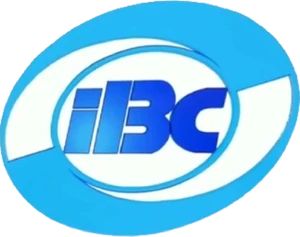
| |
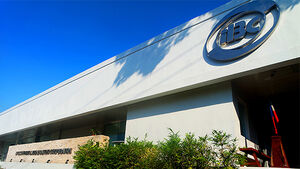 The The IBC Compound Center in Diliman, Quezon City, the corporate headquarters of IBC. | |
| Formerly | Inter-Island Broadcasting Corporation (1959–1975) |
|---|---|
| Type | Private (1959–1986) State agency (1986–present) |
| Traded as | PSE: IBC13 |
| Industry | Mass media/Entertainment (1960-1986, 2013-present) State media/Public (1986-present) |
| Founded | October 1, 1959; 64 years ago |
| Founder(s) | Dick Baldwin |
| Headquarters | Broadcast City, Capitol Hills, Diliman, Quezon City, Philippines (1978-2018) IBC Compound Center, Lot 3-B, Capitol Hills Drive cor. Zuzuarregui Street, Barangay Matandang Balara, Diliman, Quezon City (2018-present) |
| Area served | Worldwide |
| Key people | Cheloy Velicaria-Garafil (Secretary, Presidential Communications Office) Honey Rose Mercado (PCO Undersecretary for Traditional Media and External Affairs) Arturo Alejandrino (Chairman) Jose "Jimmie" C. Policarpio Jr. (President and CEO) Maria Corazon Reboroso (General Manager) Dave Fugoso (Finance Manager) Ronnie Suarez (Engineering head) Board of Directors: Alexander Bangsoy Marilyn Montano Catherina de Leon Vilar Josefino Manhilot Jennifer Jurado |
| Products | Films Music Television program Web portals |
| Services | Broadcasting Radio Streaming Television |
| Revenue | ₱22.05 billion (FY 2021) |
| Operating income | ₱2.53 billion (FY 2021) |
| Net income | ₱5.30 million (FY 2021) |
| Total assets | ₱10.52 million (FY 2021) |
| Total equity | ₱24.52 billion (FY 2020) |
| Owner | Dick Baldwin (1959–1962) Soriano Group (1962–1975) Roberto Benedicto (1975–1986) Government of the Philippines (Presidential Communications Office) (100%) (1986–present) IBC Holdings, Inc. |
| Number of employees | 178+ (FY 2022) |
| Parent | IBC Holdings, Inc. |
| Divisions | IBC Publishing IBC Digital Media IBC Entertainment Group IBC Talent Center IBC Lingkod Kaibigan Foundation IBC News and Public Affairs IBC Regional IBC Sports IBC International IBC Digital IBC Mobile IBC Music IBC Films IBC Licensing |
| Subsidiaries | List of subsidiaries |
| Website | ibctv13.com |
| Type |
Broadcast commercial television network |
|---|---|
| Branding | The Kaibigan Network[1] (Kaibigan is a Filipino term for "friend") |
| Country | Philippines |
| Availability | National |
| First air date | October 1959 (test broadcast); 64 years ago March 1, 1960 (actual launch); 63 years ago |
| Founded | by Dick Baldwin |
| Slogan | Kaibigan Mo (English: Your Friend) |
| TV stations | List of IBC stations |
| Market share | 25.7% (Nielsen Urban National TAM 2020) |
| Headquarters | IBC Compound Center, Lot 3-B, Capitol Hills Drive cor. Zuzuarregui Street, Barangay Matandang Balara, Diliman, Quezon City |
| Owner | Government of the Philippines (Office of the Press Secretary) (100%) (1986-present) |
| Area | Philippines |
| Key people | Arturo Alejandrino (Chairman) Hexilon Josephat Thaddeus G. Alvarez (President and CEO) Robert T. Rivera (COO for Broadcast) Maria Corazon Reboroso (General Manager and CCO) Jay Sonza (Head of IBC News and Public Affairs) Wilma Galvante (Head of IBC Entertainment Group) Augusto Tolentino (Regional Manager for IBC Regional) Gina P. Borinaga (Production Manager, September 1992-present) Snow Badua (Head of IBC Sports) |
| Launch date | October 1959; 64 years ago (test broadcast) March 1, 1960; 63 years ago (first air date) |
| Former names | Inter–Island Broadcasting Corporation (1959–1975) E13 (1987–1989) Islands TV–13 (1990–1992) |
| Picture format | 480i (SDTV) 1080i (HDTV) |
| Sister network | DMZ Channel DZTV TeleTrese IBC Classics IBCinema IBC Kids IBC Plus |
| International channels | Global IBC IBC News Network International |
| Language | Filipino
|
International Broadcasting Corporation (IBC) is a Philippine state broadcaster and a Filipino media company based in Diliman, Quezon City, Philippines. It is primarily involved in television and radio broadcasting, with subsidiaries dealing in various media related businesses. The majority of its profits are derived from publicity and marketing incomes associated to television distribution. IBC is the government-owned and -controlled corporation owned by the Government Communications Group under the Presidential Communications Office (PCO) and also the largest media company in the Philippines in terms of revenue, operating income, net income, assets, equity, market capitalization, reach, audience share, number of employees and number of stations. As one of three government-owned and controlled television stations, IBC, along with government-owned media companies People's Television Network, Radio Philippines Network and Presidential Broadcast Service-Bureau of Broadcast Services, form the media arm of the PCO and it is designated as a secondary state broadcaster that primarily broadcasts sports and entertainment, news and public affairs, education, culture, arts and lifestyle programming.
Founded on October 1959, it currently owns and operates two national television networks (IBC and IBC Plus), five digital television channels (IBC Classics, IBCinema, IBC Kids, DZTV TeleTrese and DMZ Channel), two national radio stations (DZTV Radyo Budyong 1386 kHz and 89 DMZ), two regional radio networks (Radyo Budyong and Danze Music Zone), and one regional TV network. It also operates two international channels (Global IBC and IBC News Network International), along with subsidiaries such as music production and publishing (IBC Music), film production and distribution (IBC Films), publishing firm (IBC Publishing), talent development and management (IBC Talent Center), cellular telephony provider (IBC Mobile), over–the–top platform (IBC Video), digital terrestrial television providers (IBC Digibox and IBC Go) and a number of internet and digital converging technology (IBC Digital Media) in the Philippines, as well as digital and online portals technology (IBC Digital, IBCtv13.com, News.IBCtv13.com, 89DMZ.com and IBC Life). The company is a publicly traded company on the Philippine Stock Exchange.
As one of the attached agencies of the OPS, IBC receives funding from the General Appropriations Act (Annual National Budget) and sales from blocktimers and advertisers, among others.
History[]
The beginnings[]

DZTV Channel 13 logo used from March 1, 1960–January 31, 1975.

DZTV Channel 13 logo used from March 1, 1960–February 28, 1966.
Island Broadcasting Corporation was established on October 1 ,1959, when DZTV Channel 13 in Manila went its test broadcast. On March 1, 1960, at 6:30 pm, DZTV-TV 13 was finally launched[2][3] and it became as the third television station in the country after the monopoly of DZAQ-TV of ABS and DZXL-TV of CBN owned by the Lopez family's Bolinao Electronics Corporation (now ABS-CBN Corporation). Its original location was at the corner of P. Guevarra St. (formerly Little Baguio) in San Juan City from 1960 to 1978. American businessman Dick Baldwin was the station's first owner and programming consisted of mostly foreign programs from CBS and a few local shows.[4]
Andrés Soriano, Sr. of San Miguel Corporation acquired the network in 1962. Soriano was also the majority owner of the Radio Mindanao Network (RMN) and the Philippine Herald newspaper. Soriano's combined media interests formed the first tri-media organization in the Philippines.[5][6][7] As the television arm of the RMN, it partnered with the RMN radio stations for coverage of the general elections of 1969 and 1971. The station had relay transmitters to bring its programs to viewers in Cebu and Davao, with plans to open more in other cities.

DZTV Channel 13 logo used from March 1, 1966–January 31, 1967.

DZTV Channel 13 logo used from February 1, 1967–January 31, 1975.
Between 1970 and 1972, IBC launched its color transmission system, Vinta Color, named after the vintas from Zamboanga, becoming the third network in the Philippines to convert to all-color broadcasts, after ABS-CBN and RPN. In September 1972, then-President Ferdinand Marcos declared a martial law for the entire country, resulting IBC and other television networks (except Kanlaon Broadcasting System which was owned by a Marcos crony, Roberto Benedicto) was forced to shutdown by the government.[8] However, a few months later, IBC allowed by the government to return to the air.[9]
ABS-CBN veteran Ben Aniceto became the station manager of DZTV Channel 13 from 1973 to 1976.[10]
The Benedicto years[]
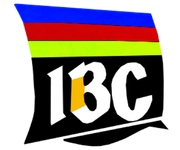
Logo used from February 1, 1975–1976.

Logo used from 1976–1978.
On February 1, 1975, the network was acquired by Roberto Benedicto (who also owned Radio Philippines Network and Banahaw Broadcasting Corporation) from the Soriano group due to a constitutional limitation prohibiting the ownership of media by non-Filipinos or by corporations not 100% Filipino owned.[7] The company name was changed to Intercontinental Broadcasting Corporation (IBC). IBC would launch an FM station. DWKB-FM. the same year. Marking the relaunch, the network debuted its vinta logo (which would be used until 1978 in two iterations).

Logo used from 1978 to 1985.

Logo used from 1984 to 1987.

Logo used from 1985 to 1986.
In 1976, IBC became one of the country's most-viewed TV networks with its primetime lineup and full-length local and foreign films aired on this channel. This catapulted IBC into the number one slot among the four rival networks and also emphasized it as the birthplace of the golden age of Philippine television, with many top series headlined by hit stars on radio, TV and film. Among its top-rated shows were Metro-Goldwyn-Mayer film series of Tarzan that starred Johnny Weissmuller, showbiz talk shows See-True and Seeing Stars hosted by Inday Badiday and Joe Quirino respectively, and comedy shows Iskul Bukol, Chicks to Chicks, and T.O.D.A.S. (Television's Outrageously Delightful All-Star Show).[11]
Using the new income generated from its programs, the network built and finally moved to its present home at the modern Broadcast City, together with its sister networks RPN and BBC in July 1978.[7] The complex was a 55,000 m2 (590,000 sq ft) tract located at Capitol Hills, Diliman, Quezon City. At the same time, IBC built a new transmitter in San Francisco del Monte, Quezon City to replace the old transmitter in San Juan. IBC manifested an enviable resilience in surviving the challenges. It marked the biggest, most progressive leap any network has ever made. Because of its station produced shows and co-production ventures, it penetrated a wider market. Thus, remarkable productivity surfaced with a acquisition of several provincial TV and radio stations. It was one of the most dominant networks in the days of president Ferdinand Marcos. By 1982, however, IBC would lose its top spot and become the second slot to RPN, albeit with many great local and foreign programs that were popular among viewers.
1986–1990: Post-EDSA Revolution, sequestration, Life Begins at 13, and Pusong Pinoy, Pusong Trese[]

Logo used from 1986 to August 4, 1987.
In 1986, the People Power Revolution (also known as the EDSA Revolution) ousted the dictatorial president Ferdinand Marcos and installed Corazon Aquino as the new president of the Philippines. Following those events, IBC, RPN and BBC, were sequestered by the Presidential Commission on Good Government (PCGG) for allegedly being part of the crony capitalism under the Marcos regime. A board of administrators was created to run all three networks.[12]
When it became a state channel, a new logo debuted featuring IBC and 13 on separate circles, a revamp of an earlier logo which debuted in 1978-79. The new slogan Basta Pinoy sa Trese was in a circle to commemorate the People Power Revolution.
President Aquino turned over IBC and RPN to the Government Communications Group and, through an executive order, awarded BBC's Channel 2 frequency to ABS-CBN. When BBC closed down on March 20, 1986, both the IBC and RPN absorbed the majority of its displaced employees, which led to the doubling of the network's expenses, and a three-fold increase in the cost of programming. Line-produced shows and co-production ventures with some big film companies like Viva, Regal, and Seiko were favored, aside from their station-produced programs.

Logo used from August 5, 1987–June 30, 1989.
In 1987, IBC rebranded and adopted a new slogan, "Life Begins at 13", noted for the butterfly logo in the form of the letter E and the number 13. By this time, IBC was struggling to cope with the increased competition from the other networks, particularly from ABS-CBN, which rose to number 1 by 1988. IBC's top-rated shows were stolen by rival networks; however, it scored a victory when it acquired the program Loveli-Ness, starring Alma Moreno, from ABS-CBN in 1988. However, the cost of programs, talent fees and TV rights increased, until IBC could no longer afford to produce its own shows, save for its news and public affairs programming and special events.

Logo used from July 1, 1989-July 31, 1990.
In July 1, 1989, IBC once again adopted a new slogan, "Pusong Pinoy, Pusong Trese" (Heart of Filipino, Heart of Thirteen), in an attempt to recapture the network's former glory. Despite this, advertising support began to decrease, due to the sequestration, internal problems, and periodic management changes. However, the network once more made history when Nora Aunor signed with IBC as a network talent, and her program Superstar was relaunched that fall on IBC.
In February 23, 1990, IBC inaugurated its 500-foot Central Tower located along Roosevelt Ave, San Francisco del Monte, Quezon City, the tallest man-made structure in the country.
1990–1992: Islands TV–13[]

Logo used from August 1, 1990 to October 2, 1992.
By October 1990, IBC was last (#5) in the ratings. In October of that year, Islands Broadcast Corporation, under the leadership of Alfonso Denoga and Gil Balaguer, took over the management and marketing of IBC. The network was rebranded as Islands TV-13 (pronounced on air as "Islands TV one-three"). The new logo featured three triangles and was adorned by the slogan, "The Newest Network".
In November 1990, IBC became a 100% government-owned station by virtue of a compromise agreement between the PCGG and Roberto Benedicto.
Ratings and income suffered due to mismanagement by Islands Broadcast Corporation, causing labor unrest. In March 1993, the Makati City RTC issued a court order terminating Islands Broadcast Corporation as the marketing and sales agent of IBC 13 due to unpaid financial obligations to the networ
.[13]
Return of operations, Pinoy ang Dating and Vintage Television[]
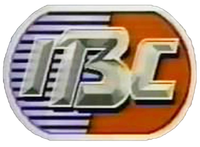
Logo used from October 3, 1992–May 27, 1994. while the network was launched as the new slogan Intercontinental Broadcasting Corporation.

Logo used from October 3, 1992 to December 31, 2001.
In October 3, 1992, Islands TV-13 was rebranded back to IBC. The management and marketing were returned to IBC's board of directors. The programming remained the same, in preparation for the launching of a new image for the station.[7]

Logo used from May 28, 1994 to 1995 and July 13, 1998 to December 31, 2001.
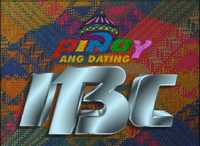
Logo used from May 28, 1994 to 1995 and July 13, 1998 to July 23, 1999. The design of the stylized "13" is a descendant of the one found in the station logo design used in the 1970s and 1980s.
On May 27, 1994, IBC launched its new slogan Pinoy Ang Dating with a music video featuring Grace Nono. The said ident won the Gawad CCP Award for Best Station Identification in the said year.[14] Despite limited resources, programming improved but the battle for audience share continued. Advertisers became more responsive to marketing efforts. The following year, IBC began to broadcast its programs via satellite nationwide, after RPN in 1980, ABS-CBN in 1989, GMA Network in 1991 and PTV in 1992. Soon after, IBC landed 4th place in primetime ratings.[15]
In 1996, Vintage Enterprises transferred to IBC as part of the launching of Vintage Television (VTV), a primetime block that aired on IBC with PBA, Blow by Blow and other Vintage Sports-produced programs after moving from another government-owned station, People's Television Network (PTV). The block helped IBC 13 move to third place in the primetime ratings, mainly credited to the airing of the PBA games.[16] At the same time, IBC installed a new Harris 60-kilowatt transmitter in San Francisco del Monte for clearer TV reception and began using the APSTAR 1 satellite to broaden its international reach.
On July 1, 1998, veteran actress Boots Anson-Roa (replacing Gemiliano Templo) served as the president and general manager of the network, who appointed by the administration of then President-elect Joseph Estrada. In July 13, 1998, the network has been reinvented its Filipino news program Express Balita (originally known as IBC Express Balita from July 13, 1998 to February 15, 2002), which become the national flagship newscast. The same day, it made a return of Filipino language late night news broadcast with the news program IBC Balita Ngayon, the third Filipino-language late-night newscast after 8 years of hiatus (with Balita sa IBC: Huling Ulat from 1986 to 1989 and Headline Trese from 1989 to 1990). As the newscast fasten to higher than its English newscasts, all networks start to follow including GMA Network and ABS-CBN in 1999, Radio Philippines Network in 2000, NBN (now PTV) in 2001 and ABC (now 5) in 2004.
On November 21, 1998, the network produced a reunion/musical TV special entitled Homecoming sa 13: Isang Pasasalamat, which gathers all former IBC talents and stars from the 70's to the 90's, along with former employees for a grand reunion.
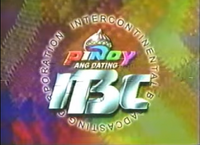
Logo used from July 24, 1999 to November 30, 2000
In 2000, Viva Entertainment's subsidiary Viva Television led by Viva chairman and CEO Vic del Rosario, Jr. acquired Vintage Enterprises (including VTV on IBC primetime block) and changed its name to Viva TV, a primetime sports and entertainment block on IBC launched on February 20, 2000[17] with PBA on Viva TV. Aside from that, IBC unveiled the primetime slot (7 to 9 p.m. on Monday, 8 to 9 p.m. on Tuesday, and 11 p.m. to 12 midnight from Monday to Friday) to boost our programming and producing the station-produced programs (IBC Express Balita (4:30 p.m. from Monday to Friday), Ronda Trese (11 p.m. from Monday to Friday), Good Take (11:30 p.m. on Monday), DMZ-TV (8 p.m. on Tuesday) and Last Fool Show (11:30 p.m. on Friday). It gave the station a boost in the ratings game, IBC remained the number three TV network in the country, a position in viewership at present.
On September 2, 2000, IBC was granted a 25-year legislative franchise extension under Republic Act 8954, albeit without President Joseph Estrada's signature; the bill lapsed into law after 30 days of inaction.[18] That same year, IBC scored a major victory with the top-rated Philippine franchise of Who Wants to Be a Millionaire?.
In February 12, 2001, Lito Balquiedra became the president of the network, replacing Roa when she running for senator. However, Lito was replaced by Renato Bello as the president in July 1, 2001. In August 8, 2001, it announced that Cerge Remonde appointed as the chairman and chief executive officer (CEO) of the network.
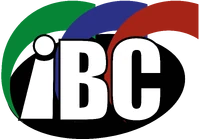
Logo used from January 1, 2002 to December 11, 2003
On January 1, 2002, IBC launched its new logo and its new slogan New Face, New Attitude with a new station ID.
However, in early 2003, Viva TV on IBC cancelled after Viva decided not to renew their blocktime agreement with IBC due to high blocktime costs and low ratings. The last Viva TV-produced program to air on IBC was the grand finale of Star for a Night, on March 1, 2003.[19][20]

Logo used from December 12, 2003 to May 11, 2008.
On December 12, 2003, IBC launched again its new logo and its new slogan Ang Bagong Pilipino (The New Filipino) with a freestyle station ID.[21]
In late 2007, IBC signed on Makisig Network as a primetime blocktimer of IBC. However, Makisig Network's programs were not aired due to questions on the propriety of the terms and conditions of the agreement, which eventually expired in October 2008. In July 2010, IBC also revived their own website, IBC.com.ph (now IBCtv13.com), the Filipino television network in the World Wide Web. It was created by IBC Interactive. Also in the same year, IBC began shifting to satellite broadcast, enabling the entire country to watch the same programs simultaneously. This was also the very year when the network began international broadcasts to Guam and Saipan, in the Northern Marianas, also via satellite, yet another first for Philippine and Asian television. At the same time, the network began to increase the number of local TV programs being aired and produced.
Abandonment and privatization[]
After four decades of serving the network's programing needs, IBC-13's studios and facilities were abandoned due to negligence and their network's mismanagement. Their cameras, lighting, props and other equipment were old and dilapidated. Budgets were cut and they could not afford to continue radio and television operations. Their programming and airtime had been lost after a network war in the late 1980s and 1990s and many employees lost their jobs. The network owed more than 800 million pesos worth of back wages to its employees, some of whom were very elderly or had worked in the network since the 1980s.[22]
As of 2016, IBC had 200 employees, 29 of which are talents or employed on a "contractual basis", particularly from the news, public affairs, and production.[23]
Management tried and failed to revive the ill-fated network. There were several plans to sell and privatize IBC and RPN.[24] TV network ABS-CBN was planning to buy the network's blocktime to address signal problems and mimic the former's programming, but ABS-CBN could not join the privatization bid due to ownership regulations.[25]
In 2011, IBC has entered into a joint venture agreement with Prime Realty, an affiliate of R-II Builders Group of Reghis Romero Jr. The agreement called for the development of 3.5 hectares of Broadcast City.[26] With this joint venture agreement with a private business enterprise, the Aquino administration expressed its desire to privatize both RPN and IBC and retain the People's Television (PTV) as a sole-mandated government TV network.[27][28]
It has been announced that conglomerate San Miguel Corporation will join the government-sponsored bidding for the privatization of RPN and IBC.[29][30]
2008–2013: Relaunch as The Kapinoy Network gaining its dominance[]
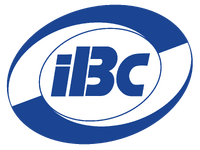
Logo used since May 12, 2008.
IBC signed a blocktime agreement with TV5's sports division Sports5 to air live sports coverage via its sports programming AKTV.[31][32] It was launched on January 1, 2010, with the AKTV Run held outside SM Mall of Asia in Bay City, Pasay. At the same day, IBC launched a new logo and slogan Where the Action Is! to reflect the change.[33]
In October 2011, IBC saw the return to airing and eventually became the permanent home of the Philippines' professional basketball league Philippine Basketball Association (PBA), which was return for the network after 8 years of hiatus and beginning in the 2011-12 season, as part of Sports5's newest partnership with the league.
Eric Canoy appointed as the chairman of IBC at the time. The new management introduced many changes including a stronger news and public affairs division, high-quality entertainment, modernization of its broadcast equipment, and the acquisition of broadcast rights of Philippine Basketball Association games via Sports5. Additionally, it also relaunched a new advertising campaign and long-time slogan, Pinoy Ang Dating, which emphasized the new lineup as being more distinct and new than being aired by its competitors at the time.
For its re-imaging, the new network executives led by Lito Ocampo Cruz coined a new slogan for IBC: Where the Action Is!. The slogan was conceived at the height of the "network wars" behind ABS-CBN and GMA Network, which mirrored each other's programming for ratings supremacy. IBC aimed to their practice done by both networks by coming up with different shows with fresh formats to complement its flagship program PBA.
In July 1, 2012, the present advertising campaign, branding and slogan, Kapinoy (literally means "a member of the Filipino"), which it believes reaffirms the network's commitment to quality Kapinoy programming that will foster the morals and values that are ostensibly upheld in many Filipino culture, families and children. The station inched its way to financial recovery, which it achieved by 2012, regularly garnering around 60% of the market. In 2012, IBC Talent Center was formed and in 2013, IBC launched IBC Music and IBC Films as the company began to diversify. Also, the acquisition and holding of shares of Intercontinental Broadcasting Corporation. Its Philippine depository receipt (PDR) is traded in the Philippine Stock Exchange under the ticker symbol IBCP.
In 2012, IBC won the '"Best TV Station" award at the 26th PMPC Star Awards for Television, with several other programs on the network also earning awards in their respective categories.
2013: IBC at 54[]
In 2013, IBC turned 53rd year anniversary since March 1, 1960. In April 11, 2013, MediaQuest chairman Manny Pangilinan announced that AKTV would not renew the blocktime agreement in May due to high costs, poor ratings,[34] and there has been doubts about IBC's future, although the PBA games is the only Sports5-produced program airing on IBC at present. In 2012, in pursuant to AO No. 26, IBC handed over its archives to Film Development Council of the Philippines (FDCP) for its restoration.[35]
2014–2017: Ito'ng Bagong Channel 13, privatization bids and property issues[]
IBC chairman Eric Canoy stepped down from his position after four years on December 31, 2013 as the last day before the new year as he resumed as the chairman of the Radio Mindanao Network (including the flagship UHF TV station BEAM 31). He was replaced by Jose Avellana, who appoined as the new chairman of IBC beginning January 1, 2014. The network begin to target a demographic range of audience by apealing the masses, male audience for sports on weekend (NBA and PBA) and Pinoy action movies (Sunday Sinemaks), and younger viewers for children, teenagers and young adults. Known for their programming, innovative promotions and trend-setting on-ground activities and events, as they complemented by the Kapinoy campaign. On January 4, 2014, IBC begins its digital broadcast on digital terrestrial television.
The same year, IBC became the award-winning TV station for the KBP Golden Dove Awards, Anak TV Seal Awards, PMPC Star Awards for TV, Gawad Tanglaw Awards, among others, with several other programs on the network also earning awards in their respective categories.In time for the station's 55th anniversary, in 2014, IBC launched its new corporate slogan and tagline Ito'ng Bagong Channel 13 with the station's new jingle performed by the Asia's young singing diva Anja Aguilar and the launch of several new shows such as the phenomenal fantasy series Janella in Wonderland, which started the trend of fantaserye genre in order to bring back the glory days of IBC as a giant network and made popular after quickly regained its foothold like its rival TV networks; as well as Tasya Fantasya, the return of Joe D'Mango's Love Notes, The Million Second Quiz, Maghihintay Sa'yo, Friends 4Ever, Dingdong n' Jessa, the revival of the soap opera Anna Luna; a revamped of their major programs for feel-good viewing habit including the daily noontime variety show APO Tanghali Na!, the daily morning show Pilipinas, Gising Ka Na Ba? and the Sunday noontime youth-oriented musical variety show Hey it's Fans Day!; a new look for their flagship news programs Express Balita and News Team 13, and the return of CelebrityDATCom. Since than, IBC would become the third dominant network in the station's programming in the midst of increasing competition in more recent years from other TV networks such as ABS-CBN and GMA.
Aside from PBA on weekends, IBC acquired Filipino broadcast rights of the 2014 Winter Olympics and 2014 Summer Youth Olympics. By that virtue, IBC has been named as the Olympic Network in the Philippines.
In a surge of phenomenal growth at the height of the "network wars", IBC earned a reputation as The Superstar Network under the network's chairman Jose Avellana and Lito Ocampo Cruz who served as President and CEO, and acquired a new franchise to opeate under Republic Act 10586 signed by the President Noynoy Aquino III.
IBC successfully launched the inaugural Kapinoy Viewers Choice Awards, the annual television awards which viewers select their favorite IBC programs voted by Kapinoy viewers through text and online voting, plus daily and grand raffle prizes and big prizes such as Daily On-Air Prizes which acclaimed after 7 days and Grand Prizes unclaimed after 15 days become forfeit which held during the annual television awards. Also in the same year, the network launches The Grand IBC Kapinoy Mulyung-Mulyong Pasasalamat Raffle Papremyo, the first, biggest, longest and most dynamic nationwide promo contest by the media network.
IBC signed a memorandum of agreement with the Asian Television Content Corporation under Engr. Reynaldo Sanchez as the major blocktimer of the station. ATC @ IBC launched their programs include the Australian kid-oriented show Hi-5, two Mexican telenovelas The Two Sides of Ana (Dalawang Mukha ni Ana) and La Teniente, and ONE FC as well as their newest programs (ATC @ IBC) under IBC News Network (INN) premiered in June 2, 2014. However, on August 31, 2014, programs under ATC @ IBC 13 block (INN) suddenly no longer aired on the network, possibly due to poor ratings and a lack of advertisers' support.[36][37][38]
PCOO Secretary Herminio Coloma, Jr. said in a Senate budget hearing for the PCOO last September 3, 2014, that the network would be fully privatized before President Aquino stepped down from office in 2016 and PTV-4 would be kept as the sole government TV network while IBC currently gained the number 3 spot. The privatization process would be managed by the Governance Commission for Government-Owned or -Controlled Corporations through the Development Bank of the Philippines. Business tycoon Manny V. Pangilinan was one of the possible bidders for the privatization, thus involving TV5 in the situation (TV5 being a media company under PLDT's MediaQuest Holdings through ABC Development Corporation. Despite expiration of blocktime agreement in 2013 (AKTV), is still using IBC's Broadcast City facilities for sports events, including its 2014 FIBA Basketball World Cup coverage.[39][40] However, MediaQuest also could not join the privatization bid due to ownership rules and regulations that MediaQuest owns TV5 and AksyonTV (now One Sports) although Sports5-produced PBA games continue to air on IBC at present.
On June 2, 2015, the Philippine Crusader for Justice (PCJ), led by Joe Villanueva, filed a petition to the Supreme Court of the Philippines to nullify the joint venture agreement between IBC and Primestate/R-II Builders for the development of 3.5 hectares of Broadcast City, after the Office of the Ombudsman found the contract to be disadvantageous to the government. The Ombudsman filed a graft case in 2013 against former IBC executives and Primestate.[41]
On September 12, 2015, IBC recently signed a deal and acquired a partnershp with Secarats Talent Management Services (STMS), the premier supplier of talents on TV, film, commercial, print ads and offer quality, effective, innovative and affordable training for singing, dance, modeling and acting workshop, under the leadership of Francis Custodio Abuan Jr. as the owner and producer. This happened after Secarats resuced the proposal from the former media partner PTV to transfer its young stars of the network that causing controversy. Since then, Secarats gained itself as the line producer and production partner of IBC.
In October 2015, Laurenti Dyogi left his position as the head of IBC Entertainment TV as a result he was returned to ABS-CBN as the returning TV Production Head after 3 years. He was replaced by Wilma Galvante as the network's new Entertainment Head of IBC in October 3, 2015. She retired was officially leaving her post as the Entertainment Head of TV5 and she returned to her position and this time as she head for IBC.
After the major revamp and with the transfer of Secarats artists and talents, IBC introduced its new shows for the 4th quarter of 2015 and 1st quarter of 2016 during the network's trade launch. Included in the lineup of new shows of IBC under Secarats are the first-ever local adaptation of Korean drama Glory Jane featuring the Mall Princess and Secarats pioneer artist and premier talent Cherryz Mendoza, the newest incarnation of Mars Ravelo classic Roberta featuring Carleen Sky Aclan and Secarats-produced programs with the likes of the young stars of Secarats Artist Group performed in the youth-oriented musical variety show Hey it's Fans Day! began in January 17, 2016. Aside from new shows of IBC under Secarats, the network will continue to produce the fantaserye, including the mermaid fantasy series Syrena featuring Sofia Andres. In January 16, 2016, the secondary slogan Ito'ng Bagong Channel 13 was dropped from the brand and retain the long-running slogan and tagline Pinoy Ang Dating.
In January 2016, President Aquino, through the Governance Commission for Government-Owned and -Controlled Corporations (GCG), approved the planned privatization of IBC.[42] The privatization terms meant the IBC would undergo public bidding with an estimated floor price of 10 billion pesos.[22] The proceeds of the bidding would go towards state-owned PTV-4, to upgrade and modernize their broadcast capabilities.[43] The Development Bank of the Philippines would be the financial adviser for the privatization. Incoming PCOO secretary Rodrigo Duterte's executive secretary Salvador Medialdea. Andanar would also coordinate with the GCG before the start of the bidding.[44]
On November 28, 2016, IBC created a sports division, IBC Sports, licensing its PBA and NBA basketball, along with boxing and cockfighting. This will form IBC Sports brand, that will air on IBC and IBC News Network.
Despite the privatization process and financial struggles within the management under the Duterte administration, IBC 13 continues to be on top as one of the Top 3 television networks in the country with male and younger viewers dominated the audience reach and increasing its viewership due to the phenomenal weeknight ratings game of the top-rating primetime superserye Mars Ravelo's Captain Barbell, the network's weekend broadcast of the Philippine Basketball Association via IBC Sports and the strengthened Nickelodeon on IBC block during weekend mornings, which included SpongeBob SquarePants. The network celebrated their 57th anniversary under the management of Jose Avellana as the chairman in coincide with their trade launch of the newest shows for 2017 held at the Bonifacio Global City Open Field in Taguig City last November 25, 2016.
The privatization process of IBC commenced in October 2016. As of December 2016, five entities had shown interest in joining the bidding. They were Ramon S. Ang of San Miguel Corporation, and the groups led by former IBC president (and current RMN president and chief executive officer) Eric Canoy, former Ilocos Sur governor Chavit Singson, energy tycoon and Udenna Corporation chairman Dennis Uy (who recently expanded his business through his recent acquisition of ISM Communications Corporation) and William Lima, a businessman from Davao.[23][45][46]
The privatization process of IBC will be commenced anytime in 2017. As of December 2016, five groups have already showed their interest to join the bidding process. These are Ramon S. Ang of San Miguel Corporation and the groups led by former IBC president (and current RMN president and chief executive officer) Eric Canoy, former Ilocos Sur governor Chavit Singson, energy tycoon and Udenna Corporation chairman Dennis Uy (who recently expanded his business through his recent acquisition of ISM Communications Corporation) and William Lima, a businessman from Davao.[23][47][48]
As of March 2017, IBC currently operated on a high powered signal and continues to broadcast from cable and satellite providers. According to data from Kantar Media Philippines, IBC currently gained its foothood in Philippine TV ratings game as the network retained the #3 spot among 5 rival networks.
2017–2018: The Birthplace of the Golden Age of Television and Trese ng Bayan era[]
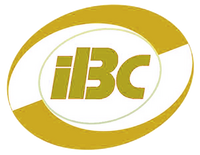
Logo used since November 7, 2017; although became the secondary logo as a gold.
In November 2017, IBC was honored as the "Best TV Station" and won 38 awards at the 31st PMPC Star Awards for Television, with several other programs on the network also earning awards in their respective categories.
On November 8, 2017, IBC retained its in-motion oval logo, the image campaign and the Kapinoy moniker, and unveiled a new gold logo, a new station ID, continuity plugs and social media accounts on the same date. On November 13, IBC revamped its new program plugs, teasers and trailers, TV messages and greetings and a new graphics, with a new logo system introduced to represent the network's entire family of networks and brands. On January 1, 2018, the gold logo of IBC also adapted and used in open tags on the network's drama, fantasy and comedy shows as well as KapinoyLand and Korean dramas regardless of the program's original airdate, while the episodes aired before the new logo launch.
The network was officially announced by Chairman Jose Avellana on December 29, 2017, along with the announcement of a new lineup of programming to debut on the network, along with a new campaign branding itself as the "Kaibigan" ("friend") network, in line with the network's re–branding. Prior to the Kaibigan network re–branding, the Kaibigan monicker was already used by Iskul Bukol (which star Joyce Abestano as the first Kaibigan star), DMZ TV and IBC news programs since December 2017 before expanding some of its programs beginning in 2018.
Two months since the network introduced their new gold logo in 2017 and in celebration of its 58th anniversary as The Birthplace of the Golden Age of Television, the new-look IBC was relaunched to the public in a trade launch on January 27, 2018 at the Bonifacio Global City Open Field, Taguig City. During the trade launch, the network showcased their dominance of viewership and ratings, their social media presence and their revivalized program line-up from entertainment, sports and news and current affairs programs produced by the network and their partnerships. IBC went on a major revamp to bring back their old glory in the network’s current state with the relaunch of a new jingle, a new advertising campaign and their new slogan Trese ng Bayan (Thirteen of the Nation).
With the relaunch, IBC continues to be on top as one of the Top 3 television networks in the country with male and younger viewers dominated the audience reach due to the network's weekend broadcast of the PBA via IBC Sports and the NBA via Solar Sports, the top-rating and award-winning curriculum-based sitcom Iskul Bukol every Saturday night and the strengthened IBC AniMEGA block, which included the anime franchise of the phenomenal Sailor Moon in February 2018, and the network once more made history when Sarah G. Live was relaunched that same year with her crossover of the Asia's Popstar Royalty Sarah Geronimo to the IBC network as a network talent.
Manolito "Lito" Ocampo-Cruz, the president and CEO of IBC, died of cancer on October 10, 2018. The same day, during the company's annual stockholders meeting, the IBC Board of Directors voted in favor and the death of Lito as the president and CEO and Katherine de Castro as his successor as president and CEO of the network, while Robert T. Rivera took over the COO of the network.
Recent developments[]
In late 2018, IBC began to revitalize its infrastructure and its programming after former DOT Undersecretary of Tourism Advocacy and Public Affairs Kat de Castro as president and chief executive officer of the network, replaced Manolito O. Cruz (who died on October 10 of the same year).[49][50][51][52] By December of the same year, the network moved its studios and offices to a new building IBC Compound Center at the corner of Capitol Hills Drive and Zuzuarregui Street, Barangay Matandang Balara, Quezon City (a property beside Broadcast City) to make way for the redevelopment of the Broadcast City property into the Larossa Condominium project of Primehomes Real Estate Development Inc. IBC also upgraded its Roosevelt Avenue analog transmitter for the Mega Manila area
The network was officially announced by Chairman Jose Avellana on December 28, 2018, along with the announcement of a new lineup of programming to debut on the Kaibigan network, in line with the network's relaunch and in celebration of its 60th anniversary since its inception in October 1959. The campaign was aggressively undertaken, with the Kaibigan, represented by a new slogan "Kaibigan Mo!". The "Kaibigan" theme song is sung by the Popstar Royalty Sarah Geronimo. The network's current station ID in short version during the top/bottom of the hour before start the programs as well as during commercial breaks/reminders it also aired on its sister channels, IBC News Network, IBC Plus and IBC Classics. Since then, IBC goes beyond traditional TV (the production of IBC's drama and live entertainment shows and the airing its entertainment, news and current affairs, cultural and sports programming, along with films) with platforms, including international licensing and distribution, digital platforms and content syndication via different streaming services.
By January 2019, IBC had regained its leadership in the Philippine TV ratings from the strong number 3 to being number 1 again nationally - as a result of the new era. On February 11, 2019, IBC announced a major revamp of its programming, including the reinvention of IBC's popular entertainment and cultural shows, and other entertainment and sports content from SMAC Television Production (later transfered to PTV as the entertainment content provider in May 2019) and ATC, among others.
On February 14, 2020, it was confirmed by Secretary Martin Andanar, Robert T. Rivera has been appointed as the new President and CEO of IBC, replacing Katherine "Kat" de Castro who has been appointed as the new General Manager and COO of PTV, while Atty. Jess Anthony Q. Yu took over the COO of the network's overall operations.
In March 10, 2020, in the wake of the coronavirus pandemic that had recently spread across the country, President Rodrigo Duterte's declaration of state of public health emergency and the World Health Organization's declaration as a pandemic, IBC announced that will temporary suspending their studio audience tapings for all of its shows, including the former's APO Tanghali Na!, It's Quiz Time, The Jon Santos Show, DMZ TV Reload, P.O.13, Who Wants to be a Millionaire?, Sarah G. Live and TSAS (The Sunday Afternoon Show). The suspensions are for the safety and well-being of the artists, crew, and production teams. The aforementioned shows will continue to air in production without a studio audience as a precautionary measure.
In March 2020, IBC announced the suspension of production on teleseryes and live entertainment shows and broadcasting their selected regular programs, due to then-President President Rodrigo Duterte implementing an enhanced community quarantine in Metro Manila and Luzon in response to the COVID-19 pandemic in the Philippines. Among of the primetime shows were affected including Bakit Ngayon Ka Lang, which will be on hold from the schedule beginning March 16 until some time in June 2020. The network aired reruns of some teleseryes and other programs including Glory Jane and Janella in Wonderland; only Iskul Bukol will continue to air a new episodes, despite a suspension of tapings. Thus, the network airs the PCOO-produced briefing on the COVID-19 pandemic in the Philippines called Public Briefing: #LagingHandaPH. On March 27, 2020, IBC began live on television via a video conferencing app, including APO Tanghali Na!, DMZ TV Reload and Sarah G. Live.
At present, since May 2020, IBC became one of the leading television networks in the country and revived as the original number 1 in order to dominate the audience share and viewership to compete with its rival TV network, GMA Network and other TV networks in the Philippines, including PTV.
In May 2020, PCOO Secretary Martin Andanar announced that the network will be used for airing educational television programs by the Department of Education's DepEd TV programming block on analog free-to-air television, the test broadcasts aired from August 11 until 21, 2020 and again from September 21 until September 25, 2020. Official broadcast formally started on October 5, 2020, the starting date of classes in public schools throughout the country.[53] On June 2020, IBC resumes the production of the network's drama and entertainment shows. In addition, stars from the foreclosed ABS-CBN were announced to be transferred to IBC as the former implemented retrenchments following the non-renewal of its broadcast franchise. Currently, IBC is in talks with the same network for the possibility to hire the displaced employees of its former rival with IBC chairman Jose Avellana stating that they are open to work with them.
On February 17, 2021, Hexilon G. Alvarez was appointed as the new president and CEO of IBC, replacing Rivera who in turn, was transitioned as the new COO for Broadcast.
The Kaibigan network[]
In 2018, IBC launched its present brand name, "Kaibigan" (literally means "a member of the friend").
Expansion[]
On October 1, 2011, IBC signed a historic deal with Dish Network and DirectTV to bring the first trans-Pacific Asian programming to some two million Filipino immigrants in the United States. This deal would later gave birth to Global IBC which is now available globally. This global expansion signals a new directions for IBC as it becomes accessible to the rest of the world, particularly the millions of Filipinos overseas.
The company has also syndicated its programs for international audience through its IBC International Distribution division. Among the programs that gained popularity abroad are the popular and top-rating shows like Janella in Wonderland, Voltron Man, Glory Jane, Syrena and Iskul Bukol.
Since the 2012, IBC has expanded into various successful media and entertainment ventures such as new media with IBC Digital Media, international television distribution with IBC International, digital TV with IBC Digital Channels, talent development and management with IBC Talent Center, print publishing with IBC Publishing, music and video recording, publishing and distribution with IBC Music, film and television production and distribution with IBC Films, telecommunications with IBC Convergence and sports programming with IBC Sports.
IBC had a venture in online gaming industry in the Philippines through its subsidiary IBC Multimedia, Inc. Another venture was the 5 million dollar deal with the social network site Facebook.
The network has its own merchandising in our local and worldwide markets incorporates the licensing and merchandise IBC Licensing Group, selling merchandise featuring IBC shows, the network-based department to produce merchandising items from IBC programs. The Kaibigan Network began to produce a music-themed series for the network through the music recoreding company IBC Music, help launch albums in conjunction with the label tied to IBC shows and produce original songs for the programs to be released as singles as result.
In response to the process of shifting to Digital Television Philippines, IBC will invests P300-500 million as the preparation for its shift to digital TV. IBC, IBC News Network and IBC Plus conducts digital test broadcast on channels 26 to 28 operated by Intercontinental Broadcasting Corporation.
On 30 May 2013, Intercontinental Broadcasting Corporation, through its subsidiary IBC Convergence, Inc., signed a network sharing agreement with Globe Telecom for a new mobile telephony service in the country. The agreement includes the sharing of assets including switches, towers, servers, and frequencies. IBC is expected to spend between 1 to 3 billion pesos for the next two years to build up its telco business. The plan has been approved by the National Telecommunications Commission and operates as IBC Mobile.
Executive management[]
- Arturo Alejandrino (chairman of the board)
- Jose "Jimmie" C. Policarpio Jr. (president and chief executive officer)
- Maria Corazon Reboroso (general manager, director)
- Robert T. Rivera (chief operating officer)
- Dave Fugoso (chief financial officer, finance manager)
- Jay Sonza (vice–president/head of IBC News and Public Affairs)
- Nick Mendoza (manager, news department)
- Pia Castro–Medenilla (news director)
- Jinky Baticados (supervisor for news operations)
- Jess Caduco (supervisor for news production)
- Gina P. Borinaga (production manager)
- Snow Badua (head of IBC Sports)
- Jerrold Tarog (vice–president/head of IBC Entertainment Group)
- Augusto Tolentino (regional manager for IBC Regional)
Assets[]
Main article: List of assets owned by Intercontinental Broadcasting Corporation
See also[]
- List of Philippine media companies
- Philippine television networks
- Television channels
- People's Television Network
- Presidential Broadcast Service
- Radio Philippines Network
- IBC-13 Program Schedule
References[]
- ↑ Kaibigan channel lalaban sa Kapuso, Kapamilya at Kapilipinas|publisher=Abante|date=February 22, 2019|accessdate=February 22, 2019
- ↑ 1960 0301 DZTV 13 opening ad |publisher=gorio72 on Flickr |date=March 1, 1960 |accessdate=August 4, 2020
- ↑ Kapitan: Geny Lopez and the Making of ABS-CBN|publisher=ABS-CBN Publishing|date=November 7, 2006|pages=77|isbn=978-971-816-111-1|location=Quezon City|language=en
- ↑ About Us|website=Intercontinental Broadcasting Corporation|access-date=November 26, 2022
- ↑ [Kapitan: Geny Lopez and the Making of ABS-CBN|publisher=ABS-CBN Publishing||date=November 7, 2006|pages=77|isbn=978-971-816-111-1|location=Quezon City|language=en]
- ↑ RMN: The Henry R. Canoy Story|publisher=Solo Press|year=1997|pages=196|location=Cagayan de Oro|language=en]
- ↑ 7.0 7.1 7.2 7.3 About Us|website=Intercontinental Broadcasting Corporation|access-date=November 26, 2022
- ↑ KBP Members|publisher=Kapisanan ng mga Brodkaster ng Pilipinas|access-date=August 1, 2020
- ↑ KBP Members|publisher=Kapisanan ng mga Brodkaster ng Pilipinas|accessdate=August 1, 2020
- ↑ ABS-CBN's post-EDSA boss Ben Aniceto passes away|publisher=ABS-CBN News|date=March 21, 2016|accessdate=March 21, 2016
- ↑ IBC 13 Official Website > About Us|website=Intercontinental Broadcasting Corporation|accessdate=August 1, 2020
- ↑ Executive Order No. 11, series 1986|first=|last=|website=Official Gazette|date=April 8, 1986|accessdate=July 7, 2020
- ↑ Court stopped TV-13 marketing agent
- ↑ IBC-13 "Pinoy Ang Dating" MTV
- ↑ https://www.youtube.com/watch?v=4xJj1ME0meQ
- ↑ Red, Isah V. (1996, March 23). VTV SHAKES INDUSTRY. (Ester. G. Dipasupil, Ed.) Manila Standard, X(42), p. 28B.
- ↑ Full circle for Bobong |publisher=philstar.com |date=April 20, 2005 |access-date=April 20, 2005
- ↑ R.A. 8954 The LawPhil Project|date=September 2, 2000|access-date=August 1, 2020
- ↑ What makes Star For a Night different |publisher=Philstar.com |date=February 6, 2003 |access-date=February 6, 2003
- ↑ The Star for a Night album is now ‘gold’ |publisher=Philstar.com |date=May 21, 2003 |access-date=May 21, 2003
- ↑ IBC 13 "ANG BAGONG PILIPINO" Station ID [2003|website=YouTube|accessdate=December 10, 2022]
- ↑ 22.0 22.1 Duterte govt eyes sale of IBC-13 for P10B|publisher=ABS-CBN News|date=June 17, 2016|accessdate=June 17, 2016
- ↑ 23.0 23.1 23.2 Invitation to bid for IBC-13 expected in April|publisher=BusinessWorld|last=Monzon|first=Alden M.|date=March 22, 2016|accessdate=March 24, 2016
- ↑ PCGG urges gov’t to fast-track sale of RPN-9, IBC-13 ABS-CBNnews.com. 2010-08-10. Retrieved 2010-08-10.
- ↑ Mirror,Mirror on the Airwaves Inquirer.net. 2011-02-11. Retrieved 2011-02-28.
- ↑ San Miguel still keen on IBC-13, RPN-9 PhilStar.com. 12-26-2011. Retrieved 12-26-2011.
- ↑ Coloma: Privatization of RPN 9, IBC 13 in the works GMANews.TV. 03-01-2011. Retrieved 03-01-2011.
- ↑ Aquino government set to privatize RPN-9, IBC-13 MB.com.ph. 03-01-2011. Retrieved 03-01-2011.
- ↑ San Miguel to join bidding for RPN-9, IBC-13 PhilStar.com. 03-06-2011. Retrieved 03-06-2011.
- ↑ San Miguel Corp. announces plan to bid for RPN-9 and IBC-13 PEP.ph. 03-06-2011. Retrieved 03-06-2011.
- ↑ TV5 airs primetime sports block AKTV on IBC-13 PhilStar.com. Retrieved 2011-02-28.
- ↑ AKTV Official Website retrieved via www.interaskyon.com/aktv 05-11-2011
- ↑ MediaQuest keen on IBC-13 retrieved via www.philstar.com 04-04-2011
- ↑ [1] "PhilStar.com". Retrieved 2013-05-14.
- ↑ Birthplace of the Golden Age of Television|publisher=The Philippine Star |accessdate=13 March 2019 |date=26 September 2012
- ↑ IBC New Shows
- ↑ [2]
- ↑ Asian Television Content Phl Corp. launches top-notch TV programs | publisher=Philippine Star | date=June 1, 2014 | accessdate=June 1, 2014
- ↑ IBC-13 to be privatized before Aquino steps down – Coloma | publisher=Rappler | date=September 3, 2014 | accessdate=September 3, 2014
- ↑ Viva Television using IBC-13 facilities | publisher=BusinessMirror | date=September 17, 2014 | accessdate=September 18, 2014
- ↑ Group to ask SC to void deal between IBC-13, real estate firm | first=Dennis | last=Carcamo | publisher=The Philippine Star | date=June 2, 2015 | accessdate=June 2, 2015
- ↑ Gov't TV station 'bulok,' says incoming PCOO chief Andanar|publisher=ABS-CBN News|date=June 7, 2016|accessdate=June 8, 2016
- ↑ President Aquino approves privatization of IBC-13|publisher=Official Gazette|date=January 25, 2016|accessdate=January 25, 2016
- ↑ New gov’t eyes higher price tag for IBC-13|publisher=Manila Bulletin|last=Leyco|first=Chino|date=June 17, 2016|accessdate=June 17, 2016
- ↑ Chavit Singson eyes IBC network|publisher=Philippine Daily Inquirer|last=Salaverria|date=December 26, 2016|accessdate=December 27, 2016
- ↑ Chavit, 3 pa interesado sa IBC 13 (Chavit, 3 others interested in IBC-13)|publisher=Pilipino Star Ngayon|language=Tagalog|last=Andal|first=Rudy|date=December 27, 2016|accessdate=December 27, 2016
- ↑ Chavit Singson eyes IBC network|publisher=Philippine Daily Inquirer|last=Salaverria|date=December 26, 2016|accessdate=December 27, 2016
- ↑ Chavit, 3 pa interesado sa IBC 13 (Chavit, 3 others interested in IBC-13)|publisher=Pilipino Star Ngayon|language=Tagalog|last=Andal|first=Rudy|date=December 27, 2016|accessdate=December 27, 2016
- ↑ Duterte appoints Kat de Castro to state-run IBC-13|newspaper=The Philippine Star|date=August 22, 2018|accessdate=August 1, 2020
- ↑ Kat de Castro out of DOT|website=ABS-CBN News|date=August 22, 2018|accessdate=August 1, 2020
- ↑ Duterte appoints Kat De Castro to gov’t-owned IBC-13|newspaper=Philippine Daily Inquirer|date=August 22, 2018|accessdate=October 24, 2020
- ↑ [3]Ex-DOT usec Kat de Castro named to IBC board, Duterte frat brod to OFW commission|website=GMA News|date=August 22, 2018|accessdate=October 24, 2020]
- ↑ ‘Underutilized’ IBC-13 can be used as educational channel, says Andanar|newspaper=Philippine Daily Inquirer|date=May 14, 2020|accessdate=October 24, 2020
External links[]
- Official website
- IBC on KBP
- Media Ownership Monitor Philippines - Media Companies: A Triopoly Rules by VERA Files and Reporters Without Borders